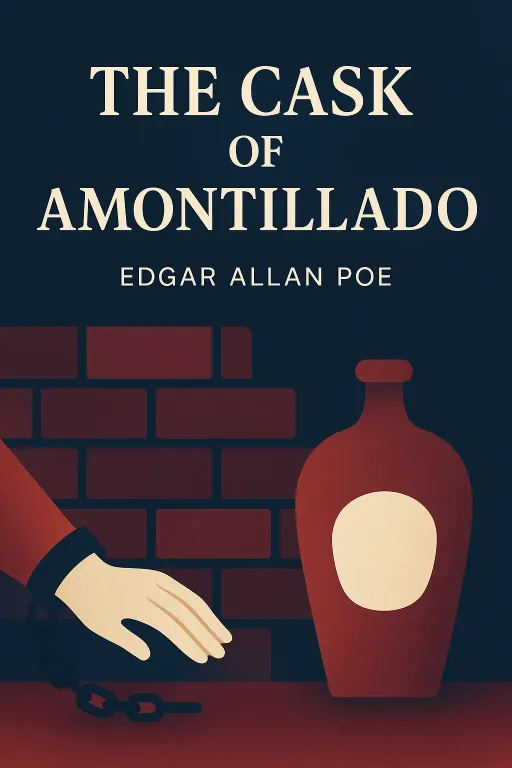
The Cask of Amontillado
9 minIntroduction
Narrator: Imagine a man so consumed by a perceived insult that he engineers the perfect crime. Not a crime of passion, but a slow, meticulous, and utterly chilling act of revenge. He doesn't want to simply eliminate his foe; he wants the man to know, with terrifying certainty, who is sealing his fate. He wants to punish his victim while ensuring his own complete and total impunity. This dark scenario, where vengeance is treated as a fine art, is not just a hypothetical question. It is the very foundation of one of the most haunting tales ever written. In his short story, "The Cask of Amontillado," Edgar Allan Poe guides us into the mind of such a man, revealing the terrifying depths of human cruelty and the anatomy of a flawless, unforgivable act.
The Anatomy of Perfect Revenge
Key Insight 1
Narrator: In the world of Montresor, the story's narrator and architect of doom, revenge is not a simple act of violence. It is a philosophy, a carefully defined craft with two unbreakable rules. As he states at the outset, "I must not only punish, but punish with impunity." This single sentence establishes the core of his motivation. For the revenge to be successful, the avenger must not suffer any consequences. But more importantly, the second rule is that the victim must be fully aware of who is delivering the punishment. An act of retribution is meaningless if the target believes it to be mere misfortune.
This philosophy is not born of a momentary rage but seems deeply ingrained in Montresor's identity. This is powerfully symbolized by his family's coat of arms and motto, which he reveals to his victim, Fortunato, deep within the catacombs. The arms depict a golden foot crushing a serpent whose fangs are embedded in the heel. The accompanying motto is "Nemo me impune lacessit," a Latin phrase meaning "No one attacks me with impunity." This isn't just a personal vendetta for Montresor; it's a family creed. He sees his actions as the fulfillment of a legacy, a righteous stamping out of the serpent who dared to strike him. This belief system allows him to proceed with a chilling sense of justification, transforming a heinous crime into a matter of honor.
Pride as the Ultimate Weapon
Key Insight 2
Narrator: Montresor's plan is a masterclass in psychological manipulation, and his chosen weapon is Fortunato's own pride. Fortunato is a respected and, in his own mind, unmatched connoisseur of wine. Montresor understands that this vanity is his enemy's greatest vulnerability. The entire trap is built around this single, exploitable flaw.
The story of the luring begins amidst the chaos and celebration of carnival season. Montresor finds Fortunato, who is already drunk and wearing the costume of a jester—a tragically ironic choice. Instead of confronting him, Montresor greets him with warmth and friendship. He then casually mentions that he has acquired a large cask of Amontillado, a rare and expensive sherry, but he doubts its authenticity. This is the bait. To set the hook, he adds that since Fortunato is busy, he will ask another expert, Luchesi, to verify the wine. The mere mention of a rival's name is an unbearable insult to Fortunato's ego. He scoffs at the idea, declaring that "Luchesi cannot tell Amontillado from Sherry." Blinded by his need to prove his superior knowledge, Fortunato insists on accompanying Montresor to his vaults immediately. Every step of the way, Montresor feigns concern for Fortunato's persistent cough and the dampness of the catacombs, suggesting they turn back. Each protest only strengthens Fortunato's resolve, as he refuses to let a lesser expert take his place. Pride, not chains, is what first leads him into the darkness.
The Descent from Carnival to Catacomb
Key Insight 3
Narrator: Poe masterfully uses the setting to amplify the story's horror. The narrative begins in the streets, filled with the "supreme madness of the carnival season." This environment of public festivity, costumes, and chaos provides the perfect cover for Montresor's sinister intentions. It's a world of masks and deception, where nothing is as it seems—a fitting backdrop for a man hiding murder behind a smile of friendship. Montresor even uses the carnival to his advantage by telling his servants he will be out all night, knowing they will abandon their posts to join the revelry, leaving him with no witnesses.
From this world of light and noise, the two men begin their descent into the Montresor family catacombs. The transition is stark and symbolic. They move from a world of life to a world of death. The air grows damp, the walls are coated in nitre that aggravates Fortunato's cough, and the path is lined with the bones of Montresor's ancestors. The festive mood of the carnival evaporates, replaced by an encroaching sense of dread. Montresor offers Fortunato more wine along the way, not as an act of kindness, but as a tool to dull his senses and weaken his will. The journey deeper into the earth is a physical manifestation of Fortunato's journey toward his doom, a descent from the heights of ego to the depths of a tomb.
The Unflinching Face of Retribution
Key Insight 4
Narrator: The story's climax is a chilling portrait of calculated cruelty. After leading Fortunato to the deepest recess of the catacombs, Montresor's friendly facade dissolves. He quickly chains the intoxicated Fortunato to the granite wall. It is only then, as the cold iron snaps shut, that Fortunato begins to comprehend the reality of his situation. The tool of his entombment is a simple trowel, which Montresor had revealed earlier in a moment of dark foreshadowing.
As Montresor begins to lay the first tier of bricks, Fortunato's drunkenness wears off, replaced by a mortal terror. His screams echo in the vault, but Montresor is unmoved. He sits and listens, savoring the sounds. When Fortunato makes one last, desperate plea—"For the love of God, Montresor!"—the avenger simply echoes the words back at him before placing the final stone. The silence that follows is broken only by the jingling of the bells on Fortunato's jester cap. Montresor's final words on the matter, spoken fifty years after the event, are a testament to his complete lack of remorse. He concludes his tale by saying he placed the final stone and his heart "grew sick," but only because of the "dampness of the catacombs." He then utters a final, ironic prayer for his victim: "In pace requiescat!"—May he rest in peace. The perfect revenge was complete.
Conclusion
Narrator: The single most important takeaway from "The Cask of Amontillado" is its terrifying exploration of the dark potential of human nature. It reveals that the most horrifying acts are not always born from madness or chaotic rage, but can be the product of cold, patient, and rational thought. The story is a clinical dissection of a mind that has elevated revenge to an art form, using another person's humanity—their pride, their trust, their very life—as the raw material for its creation.
Poe leaves us with a deeply unsettling thought. Montresor is not a monster from a distant land; he is a man of society, polite and calculating, who walks among his peers. The story serves as a timeless and chilling reminder that the line between a perceived slight and a disproportionate, horrifying response can be terrifyingly thin. It forces us to ask: what darkness might lie dormant behind the most civilized of masks, waiting for the right moment to emerge?









